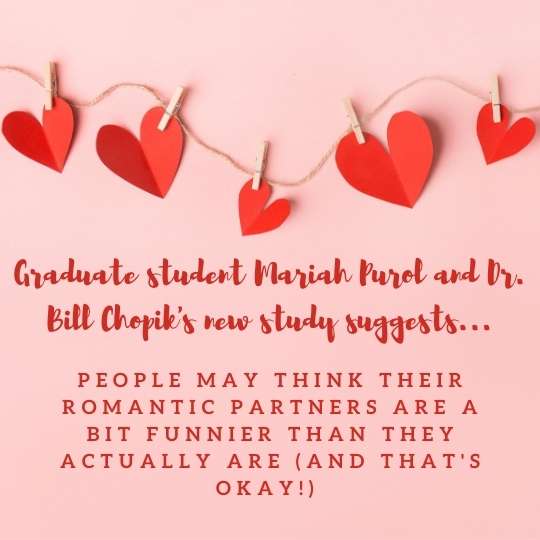Your partner probably isn't quite as funny as you think they are (and that's okay!)
February 15, 2022 - Liz Schondelmayer
 When it comes to a potential romantic partner, there aren't many people who wouldn't consider a great sense of humor to be an extremely attractive quality. Why else would Pete Davidson be everyone's current celebrity crush?
When it comes to a potential romantic partner, there aren't many people who wouldn't consider a great sense of humor to be an extremely attractive quality. Why else would Pete Davidson be everyone's current celebrity crush?
However, despite the near-universality of our desire to be with a partner we find funny, what each of us considers humorous is deeply personal - and highly subjective. This is why Michigan State University social scientists started researching how we perceive our partners' humor and how it affects overall relationship satisfaction.
The study, led by graduate student Mariah Purol and social scientist Dr. Bill Chopik in the Department of Psychology and published in the Personality and Social Psychology Bulletin, found that while most of us look at our partners through rose-colored glasses, we are able to fairly accurately assess our partner's sense and style of humor - though we do inflate our evaluation a bit due to our own personal bias.
"Humor is so important for romantic relationships - people want partners who make them laugh! But no one shares the same sense of humor; everyone thinks different things are funny," explained Purol, who conducted this research for her graduate thesis. "I thought it was so interesting that something so valued in a potential partner was also so subjective."
To conduct this research, Purol and Chopik surveyed over 300 heterosexual partners across the lifespan, with an average relationship duration of 37 years (though some couples had only known one another a month, and others had been together for almost 70 years). Individuals were asked to rate their partner's level of humor and identify the types of humor their partner employs most often.
When evaluating humor "types," Purol and Chopik used 4 different subcategories: affiliative (positive humor using jokes or stories to connect with others); self-enhancing (positive self-directed humor helping one to cope with daily life); aggressive (negative humor relying on harsh sarcasm and mean-spirited or offensive jokes); and self-deprecating (negative humor making fun of oneself). The researchers found that people tended to project their style of humor onto their partners, even when their partner has a slightly different sense of humor.
Overall, however, the researchers found that people are mostly able to accurately assess and identify their partner's humor styles - and that the funnier people found their partners and the more positive their humor styles were, the more satisfied they were overall in their relationship.
"We did find some evidence that positive biases about your partner's humor can be a good thing - assuming you and your partner use the same kind of humor was tied to happier relationships," said Purol. "However, the strongest effect we found was one of accuracy. People aren't operating solely with rose-tinted glasses! We generally know how our partners use humor."
"All in all, being a little positively biased about your partner might be good for a relationship," noted Chopik. "As long as you aren't to the point of being delusional about them and their traits."
In the future, Purol is interested in conducting similar research that studies the evolution of how our perception of our partner's humor changes over time and the course of the relationship.
Read the study here.
Find the original version of this article here.

